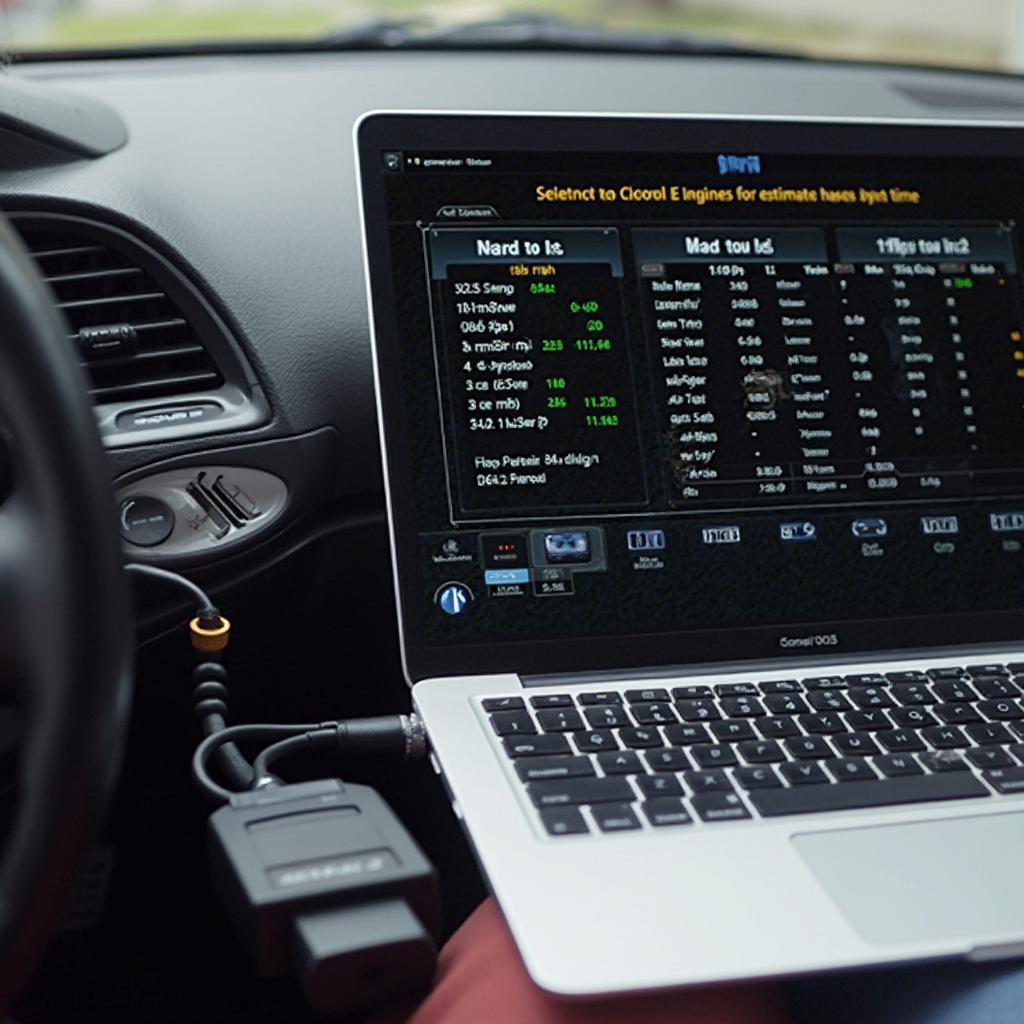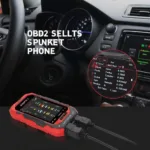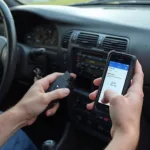Does OBD2 tell 0 to 60 time? The short answer is not directly. While an OBD2 scanner is a powerful tool for diagnosing car problems and accessing vehicle data, it doesn’t typically provide a ready-made 0 to 60 mph time. This information isn’t standard in the OBD2 data stream. However, there are ways to use OBD2 data in conjunction with other tools to get an estimate of your vehicle’s acceleration capabilities.
Understanding OBD2 and its Capabilities
OBD2, or On-Board Diagnostics II, is a standardized system that allows external devices, like scanners, to access a vehicle’s computer system and retrieve diagnostic information. This information can include everything from engine speed and coolant temperature to fuel system status and emissions data. It’s invaluable for mechanics and car enthusiasts alike. However, performance metrics like 0 to 60 mph times aren’t part of the standard OBD2 data set. This is primarily because this data isn’t essential for diagnosing vehicle problems or monitoring emissions.
How to Estimate 0 to 60 Time with OBD2 Data
Though OBD2 doesn’t directly tell you your 0 to 60 time, you can use some of the data it does provide to get a reasonable estimate. One method involves using an OBD2 scanner that records data logging. By logging parameters like engine speed (RPM), vehicle speed, and throttle position, you can analyze this data with third-party software or apps specifically designed for performance calculations. These apps can then estimate your 0 to 60 time based on the logged data. This method won’t be as precise as dedicated performance testing equipment, but it can provide a useful approximation.
Another approach involves using a performance meter app on your smartphone, combined with an OBD2 Bluetooth adapter. Some apps can utilize the vehicle speed data from the OBD2 system to calculate acceleration times, including 0 to 60 mph. This method offers a more streamlined approach compared to data logging and analysis.
Alternative Methods for Measuring 0 to 60 Time
For more accurate 0 to 60 mph measurements, dedicated performance testing equipment is the best option. Performance data loggers or GPS-based performance meters are specifically designed for this purpose and offer a higher level of precision than using OBD2 data indirectly. These devices often incorporate additional sensors, such as accelerometers, to provide more granular data for accurate performance analysis.
Why Isn’t 0 to 60 Time Standard in OBD2 Data?
As mentioned earlier, 0 to 60 mph time isn’t considered essential diagnostic information. The primary purpose of OBD2 is to monitor emissions and identify potential problems that could affect the vehicle’s emissions system or overall drivability. Performance metrics like 0 to 60 time are simply outside the scope of the OBD2 standard.
Can any OBD2 scanner measure 0 to 60 time?
No, standard OBD2 scanners don’t measure 0-60 times. However, some advanced scanners with data logging capabilities, combined with third-party software, can be used to estimate this metric.
“Think of OBD2 as a doctor checking your car’s vital signs,” says automotive diagnostics expert, Dr. Emily Carter. “It’s focused on health and functionality, not performance metrics like speed and acceleration. For that, you need specialized tools.”
Conclusion
While an OBD2 scanner doesn’t directly tell you your 0 to 60 time, you can leverage the data it provides to get an estimate using third-party apps and software. However, for truly accurate measurements, dedicated performance testing equipment is necessary. Understanding what OBD2 can and can’t do is crucial for utilizing this powerful tool effectively. Remember, OBD2 is a diagnostic tool first and foremost, and while its data can be used creatively, it’s not designed for performance measurement. Does OBD2 tell 0 to 60 time? Not directly, but it can offer a helpful starting point.
FAQ
- What is OBD2? OBD2, or On-Board Diagnostics II, is a standardized system that allows external devices to access a vehicle’s computer system and retrieve diagnostic information.
- Can I improve my car’s 0 to 60 time? Yes, various modifications, such as engine tuning, weight reduction, and improved tires, can enhance a car’s acceleration.
- What is data logging? Data logging is the process of recording various parameters from a vehicle’s computer system over time, allowing for later analysis.
- Are GPS-based performance meters accurate? Yes, GPS-based performance meters are generally accurate for measuring acceleration times, though dedicated performance data loggers offer even higher precision.
- Where can I find reliable OBD2 scanners? OBDFree is a great resource for information and reviews on various OBD2 scanners.
- What other data can I get from an OBD2 scanner? OBD2 scanners can provide a wide range of data, including engine speed, coolant temperature, fuel system status, and emissions data.
- What are some good performance meter apps for smartphones? Several reputable performance meter apps are available, and researching user reviews can help you find a suitable option.
Need further assistance? Contact us via WhatsApp: +1(641)206-8880, Email: [email protected]. We have a 24/7 customer support team.


